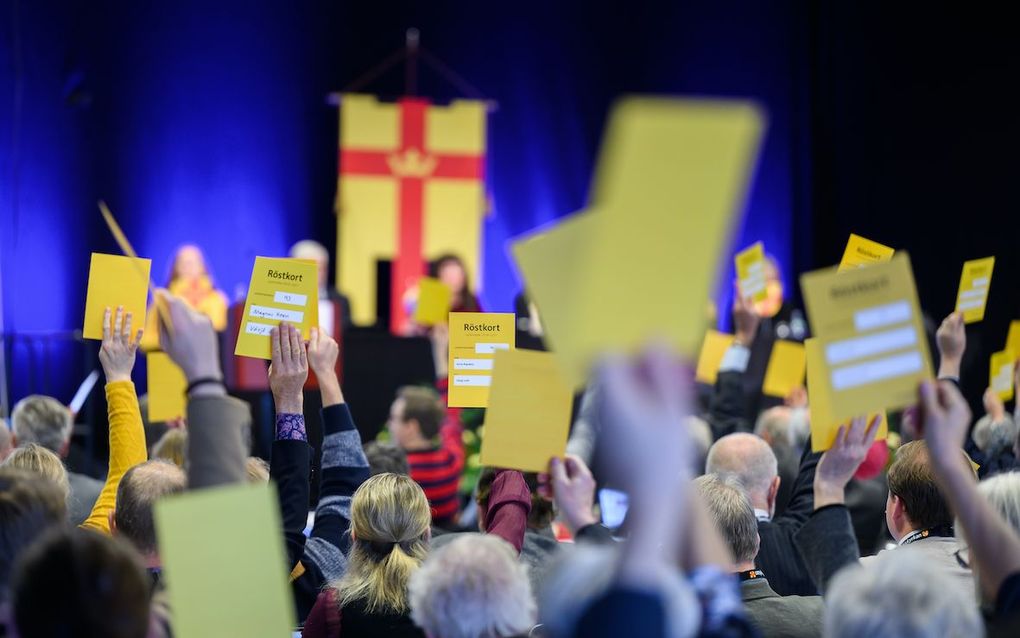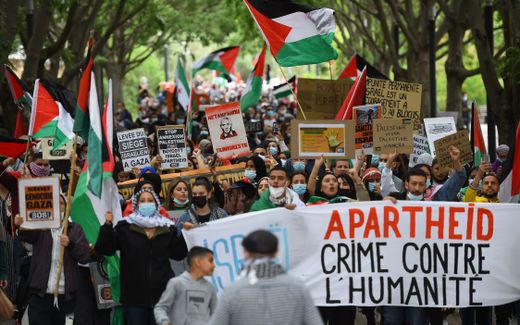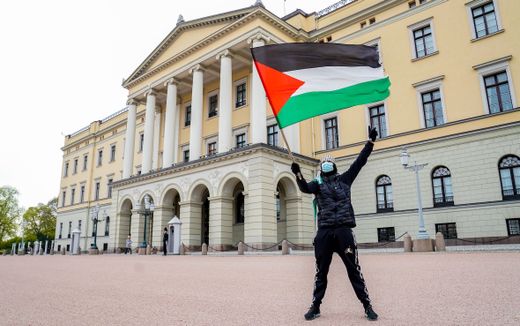Turmoil in Church of Sweden: is Israel an apartheid state?

A vote in the Swedish Church Assembly. Photo Magnus Aronson
Northern Europe
Trouble in the Church of Sweden. At the last Church Assembly Assembly, the former state church agreed to a motion to investigate Israel under suspicion of being an apartheid state. Since then, it has been raining –mainly critical– reactions. Archbishop Antje Jackelén, who disagrees with the decision, rejects the accusation of anti-Semitism.
It all started on November 23rd at the annual Church Assembly of the Swedish Church in Uppsala. The General Synod is the Church of Sweden’s highest decision-making body and consists of 251 members from throughout Sweden. They are elected from among the 6.5 million church’s members, with 249 being selected via direct elections and the remaining two being chosen by the 31 church councils within the Church of Sweden abroad.
As the Church election is a remnant from a Lutheran state church system, which was disestablished in 2000, political parties formally take part in the church ballot. Currently, only three parties still participate: the Social Democrats, the Center Party and the Sweden Democrats. Especially the Social Democrats, who were very influential in secularising the State Church from within during the last century, still have a huge finger in the church pie.

The Church Assembly (as the ‘parliament’) elects the board. That is the body that leads the church. The archbishop is presiding that board. Above this, there is the college of the 14 bishops.
Palestine
After a fierce debate at the assembly, there was finally a gasping vote in a motion on whether Israel might be guilty of apartheid, Swedish newspaper Dagen writes. The motion had been developed by church politicians from different groups and was represented by Daniel Tisell. He is a priest himself but elected on the list of the Center Party.

The proposal was from the beginning that the church council would decide to instruct the church board to have the international law situation in Israel and Palestine examined. The Ecumenical Committee had proposed rejection. “We exercisers were worried that this would not go through. Therefore, I wrote a request that was based on the committee text”, said Daniel Tisell after the decision in the church meeting to Kyrkans Tidning.
The final proposal was that the General Assembly should instruct the Central Board of the Church to promote examining the application of international law in Israel and Palestine. This must be done based on the UN Convention on Apartheid and the Rome Statute’s writings on apartheid. The issue must also be raised within international ecumenical bodies such as the World Council of Churches and the Lutheran World Federation.
Hostile
During the debate, several people opposed, not least Karlstad’s bishop Sören Dalevi, who wondered how it could be that Israel always ended up in the spotlight at the church assembly. Several others agreed, not least as many already have the image of the Church of Sweden as hostile to Israel and that this would only consolidate that image.

The criticism was to no avail. When it was time for a vote, it turned out that there was a majority to go ahead and investigate Israel based on the international conventions on apartheid. The question was decided only after the vote, which ended 127 against 103.
After the voting list had been published, it became clear that it were mainly the left-leaning, more progressive nomination groups that voted yes, Dagen wrote. The no-voters were more colourful; among them were conservatives and people who are politically right-wing, but also others. “Rarely has the gap between church politicians and bishops been as clear as in this matter”, the Swedish newspaper concluded.
Fixation
The General Synod’s decision came in for fierce criticism from Jewish groups. “An unhistorical fixation on Israel and an attempt to deprive the Jewish state of its legitimacy”, Aron Verständig said in the Swedish newspaper Dagens Nyheter. According to the spokesman for the Jewish Central Council in Sweden, the adoption of the church meeting is an expression of a general trend in which the Swedish church unilaterally criticises Israel.
With “the hint that Israel is an apartheid regime”, the relations between the Swedish Church and Sweden’s Jewish congregations now risk suffering damage, the Jewish Central Council believes. “For us Swedish Jews, Israel is incredibly important. We have a lot of cooperation with other religious communities. If the largest of the religious communities directs that type of criticism at Israel, it is a very serious signal to the Jewish congregations”, Verständig said.
Luther
Criticism also came from the Church of Sweden itself. “We are appalled by the decision of the church meeting,” wrote the bishops Åke Bonnier, Skara diocese, and Sören Dalevi, Karlstad diocese, in Kyrkans Tidning.

“As bishops, we love our church and are positive about its structures. But that does not prevent us from strongly dissociating ourselves from the decision of the Synod in this matter. A decision which, with the mention of apartheid, will be interpreted to brown paint on the land of Israel”, they write in the post, where the bishops also call for the Swedish church to refrain from foreign policy markings. “After all, we are a community of faith, not a community of attitudes.”
The bishops also point out the historical sensitivities surrounding this topic. “The Church of Sweden is a Lutheran folk church, sprung from the Reformation. We have the Reformation to thank much of the good in our society. But also, some ballast. To this ballast belongs Martin Luther’s gross anti-Semitism.” And: “Too many priests in the Church of Sweden into the 1940s were Nazis”, which is “a black spot in our history.”
According to observers around the church, it had never happened before that the bishops distanced themselves so unilaterally from the Assembly.
Misunderstood
One of the petitioners, Daniel Tisell, told Kyrkans Tidning that the adopted proposal has been misunderstood. “We are not taking a stand against Israel, we are not saying that Israel is an apartheid state, we are against anti-Semitism,” he said, emphasising while the church’s adopted policy is support for a two-state solution.
“The Swedish Church not only criticises Israel, but we also criticise other actors, such as Hamas, if they commit abuses. You have to see the decision in a larger context”, says Daniel Tisell, who was re-elected to the church board at the meeting.
Archbishop Antje Jackelén, who is the chief spokesperson for the board, is also annoyed by how the proposal from the Swedish Church’s decision-making body has been received.
“I have a great understanding that the decision provokes strong reactions, that many are upset. The decision has led to disappointment and unrest in the Jewish communities in Sweden. But at the same time, I note that there is a big difference between what is in the decision and what people read into it”, Jackelén writes in an open letter on the Swedish Church’s website.
Democratic state
“Although I think the wording is unfortunate, it is clear to me that the decision of the Synod is in no way directed at Jews as a people, neither in Sweden nor Israel nor at the state of Israel. What is being referred to are violations of human rights and international law, i.e. international law in Israel and Palestine.”
However, the archbishop’s open letter does not satisfy the Jewish Central Council in Sweden. “Israel is a democratic state where you can think what you want, and of course organisations that think the country is heading for apartheid can criticise it. But why should a Lutheran-Christian denomination go down that path?” asks Aron Verständig. “Of course, it is okay to criticise Israel. It is the one-sided criticism of the country that we are facing.”
Fight apartheid
In the past few days, there also came a response from Human Rights Watch (HRW), an organisation that is well-known for its criticism on Israel. On Twitter, HRW wrote that “more and more are recognising reality” regarding Israel. The Swedish church is praised for having the “courage to fight apartheid despite significant pressure”, Dagen reports.
Related Articles







